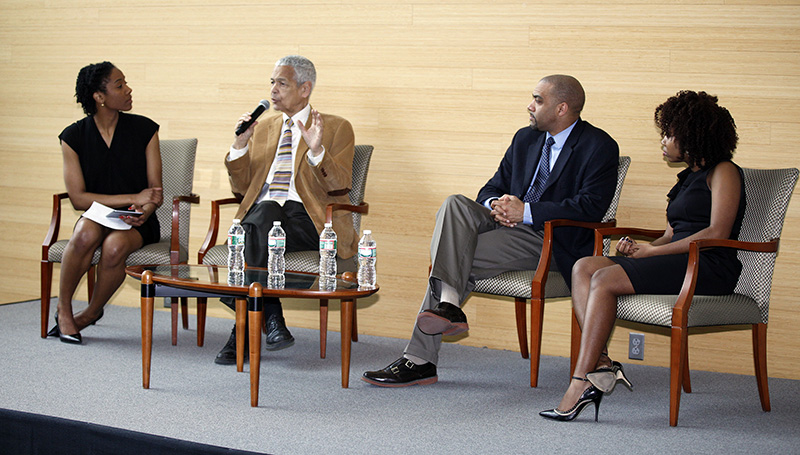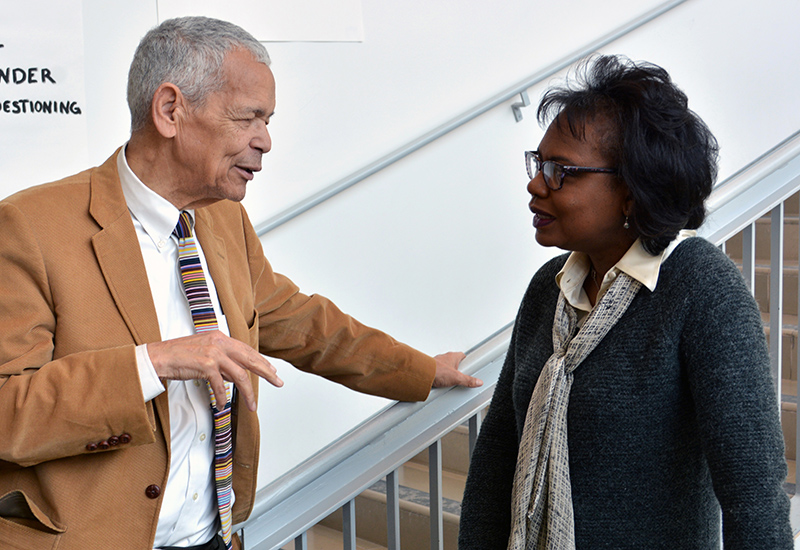By Bethany Romano

Panelists Sarah Gray (moderator), Julian Bond, Chad Williams and Maya Cooper '15. Photo credit: Mike Lovett.
Former Georgia legislator, NAACP director and civil rights advocate Julian Bond joined an April 2 panel discussion at the Heller School as the culminating event in his Brandeis residency as the 2015 Richman Distinguished Fellow in Public Life. Second year Heller School PhD student Sarah Gray moderated the conversation, guiding the panelists and audience through a broad scope of historical and contemporary civil rights issues, including mass incarceration, police brutality, wealth inequality, voting rights and educational equity.
African and Afro-American Studies Associate Professor Chad Williams noted the trajectory of the civil rights movement from the end of the Civil War through present day. “It’s also useful to approach the civil rights movement as a living and breathing thing,” Williams said. “We do the civil rights movement of the ‘50s and ‘60s a disservice by romanticizing it and keeping it frozen in time.”
Panelists and audience members frequently referenced the recent fatal police shootings of black men and boys in Ferguson, Mo. and other American communities and the subsequent surge of protests and activism, such as the Black Lives Matter movement. In terms of concrete recommendations, Bond expressed a specific desire for police reform, saying that the process for recruiting, selecting and training officers needs to change. “It’s difficult, but it’s not impossible,” to change the culture of policing, he said. “One thing—officers should live in the city where they police.”
Panelist Maya Cooper '15, a Brandeis senior, said her father’s experience as a former police officer shaped the way she views the relationship of mass incarceration to race and civil rights. “I want to live in a world where I won’t have to say to my children, ‘This is how you avoid being killed, this is how you make yourself smaller in the world,’” she said.

Julian Bond and Anita Hill. Photo credit: David J. Weinstein/Ethics Center.
From the audience, Heller Professor Anita Hill asked the panelists to reflect on new challenges that may be ahead for civil rights activists, asking “What are the frontiers? What are the new places we’re going to have to go to have a new, robust, and forward-thinking civil rights agenda?” Bond and Williams responded that reforming banking policies and revisiting the concept of reparations are two undiscussed avenues for addressing civil rights within the larger framework of systematic wealth inequality in the U.S.
The conversation also touched on education, from universal preschool to secondary education and academia. Chad Williams said that as a professor, he wants to avoid “marginalizing these issues and saving them for a special day…these issues are really crucial to the needs of our students.”
To best address the complex issues discussed, Bond said contemporary civil rights activists should focus on asking for specific goals: “I often see protests that gather many, many people together and they make an impressive play. But I often wonder, what is it they want? What is the goal they’re asking for? If you’re not clear about what you want, you can’t know when you get it.”
